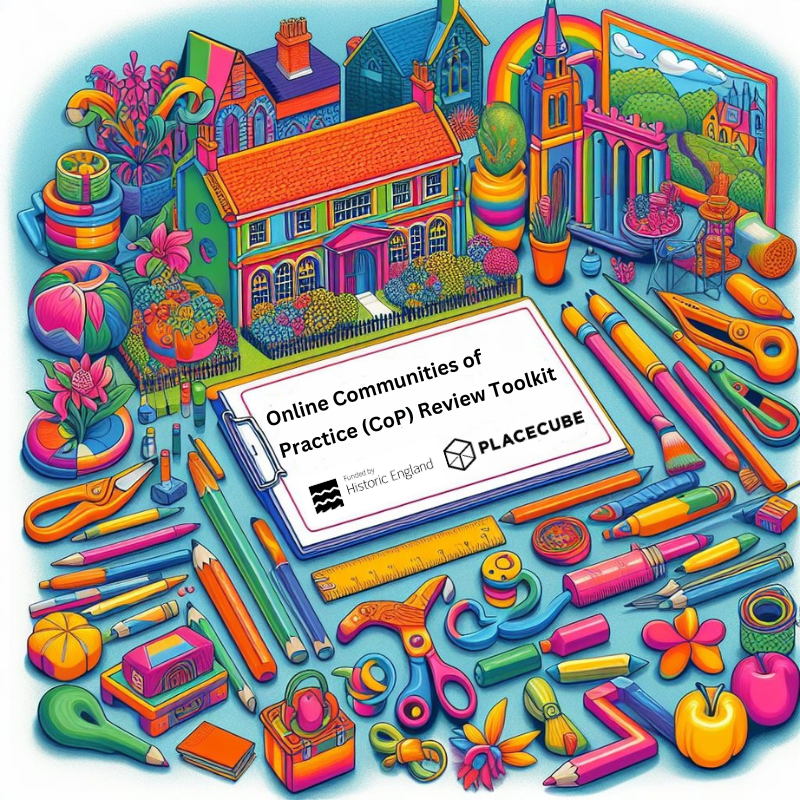Building Better Communities: Unveiling the Online Community of Practice Review Toolkit

Building Better Communities: Unveiling the Online Community of Practice Review Toolkit
Unlocking the potential of online communities has transformed the way we collaborate and innovate, but the path to success can be intricate.
Historic England, the public body that helps people care for, enjoy and celebrate England's spectacular historic environment, in collaboration with Placecube, who have been supporting public sector online communities since 2006, embarked on a mission to develop a Online Community Review Toolkit.
The review looked at three key communities to understand their effectiveness for users and organisations in the heritage sector, leading to the creation of a new resource: The Online Community of Practice Review Toolkit, which we hope will become an invaluable tool for those seeking to evaluate their own communities.
Unveiling the Toolkit: A Collaborative Journey
The toolkit's creation involved meticulous planning, pilot projects with three diverse communities, and collaborative efforts between Placecube and Historic England. It's the culmination of shared expertise and iterative improvements, resulting in a resource designed for community managers to enhance engagement within the heritage sector and beyond.
Edmund Lee, Sector Resilience Manager, Historic England.
The Three Pilot Projects
Each of the three pilot project communities - BAJR, HERFORUM, and HI HAZ - showcase unique community lifecycles and challenges that were integral to the testing and development of the Online Community of Practice Review Toolkit.
1. BAJR (British Archaeological Jobs & Resources)
The BAJR Community has been running for 24 years and currently uses Facebook as its main collaborative space, operating as a typical community of practice.
Following the review, we identified that the BAJR Community has solidified its reputation as the go-to platform for archaeologists and heritage professionals. It fosters a strong sense of belonging among members, who are very much in favour of it continuing. The community fulfils its core purpose through excelling in the facilitation of discussions and sharing job opportunities. While the passionate community management team enjoys high regard, a key challenge is the need for succession planning. Another crucial area for evolution is the need to recruit new members to sustain activity and diversity.
2. HERFORUM (Historic Environment Records)
The HERFORUM has been in operation for 28 years and currently uses JISCMail as the main tool to run its community. This is also a typical community of practice.
Following the review, it was clear that the HERFORUM continues to be the go-to place for individuals working with Historic Environment Records. Its members are dedicated, committed and keen for the community to continue. Thriving in event delivery and smoothly adapting to hybrid events post-Covid-19, the community remains robust and valuable to members. The passionate and highly esteemed community management team recognises the need for succession planning and growth through the recruitment of new members to maintain activity and engagement levels.
“It provided a very valuable opportunity to review the aims and activities of the group in a structured and systematic way. In particular, the insights provided by PlaceCube, as an external reviewer, and the work which was done in gathering and analysing ideas and opinions from within the group, will allow much greater clarity of thinking regarding the Forum’s future development.”
3. HI HAZ (High Street Heritage Action Zone)
The HI HAZ community has been in operation for 3 years and currently uses Knowledge Hub as its main community space. It is much more of a project community.
Following the review, we identified that HI HAZ has largely achieved its initial objectives and is approaching the conclusion of its lifecycle. However, fluctuations in community leadership resulted in intermittent challenges. While managed as a traditional community of practice, findings suggest a project-based approach might have been more suitable. The community's focus leaned more towards its organisation sponsor’s needs, rather than balancing those of its members and their requirements.
Managing professional online communities is a valuable, but sometimes underrepresented, area of Continuous Professional Development; the Toolkit uses the expertise of the Digital Community Managers at Placecube to represent an investment in the value of these communities for community managers and members alike. I look forward to continuing to build this evidence and recommend the Toolkit across our communities at Historic England.
Len Branson, Online Communities Adviser Apprentice, Historic England.
Building the Online Community Review Toolkit

The Online Community of Practice Review Toolkit went through a number of iterations based on the online community reviews and support from Historic England.
The full review toolkit is broken down into 8 key sections.
1. Overview - why the Online Communities of Practice Review Toolkit was developed, who the toolkit is for and how to determine if it’s right for your community.
2. Step-by-step guide - a detailed breakdown of the 5 stages of the review process:
- Plan the review
- Collect the data
- Asses the data
- Use the data
- Disseminate, use and learn
The next 6 sections covered the templates used in the review, with guidance on how to use them and examples of the communications to support them:
3. Community background questionnaire
4. Kick-off meeting
5. Community member survey
6. Self-Assessment
7. Enhancing communities workshop
8. Final report
You can download the full Online Communities of Practice Review Toolkit here.
Benefits and Future Prospects
The toolkit has been designed and developed to enable users to carry out an in-depth review of a community. Using a combination of self-assessments, surveys and questionnaires, users will be able to review a community’s performance and impact, and plan for the future, examining the process of building successful online communities. The toolkit is the ideal starting point for communities looking to understand their current position and consider actions and improvements for the future.
Don’t miss out on being a member of groups that are relevant to you. Register on Knowledge Hub https://khub.net/sign-up to find groups of interest. Can’t find the relevant group? Why not set up a group that works for you and your colleagues?

